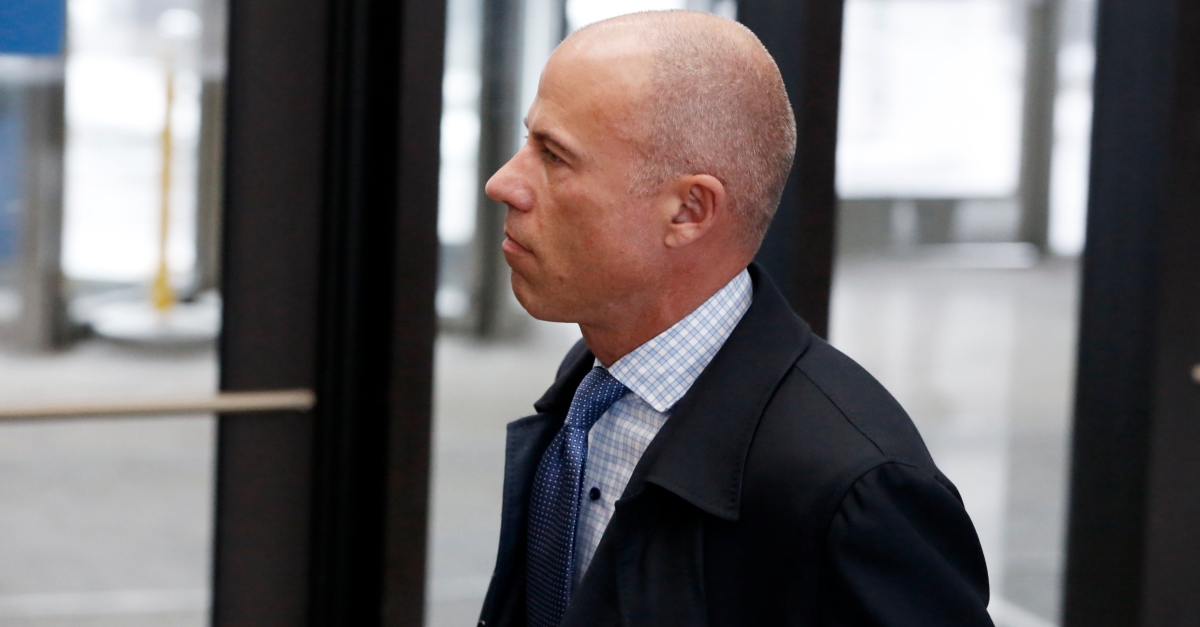
Attorneys for one-time anti-Trump #Resistance heartthrob Michael Avenatti say he should spend a maximum of six months in prison for attempting to shakedown Nike in the spring of 2019.
The pugilistic attorney, who fed off national exposure granted to him by cable news outlets like CNN and MSNBC in the early years of the Trump era, claimed that the eventual lack of attention and concomitant scorn he received after being indicted for the $23 million extortion attempt was, with time already served, sufficient punishment in and of itself.
“Avenatti’s epic fall and public shaming has played out in front of the entire world,” defense attorneys Scott A. Srebnick and E. Danya Perry argued in a sentencing memorandum filed with the U.S. District Court for the Southern District of New York on Wednesday.
“The Court may take judicial notice of this fact, as Avenatti’s cataclysmic fall has been well-documented,” the 33-page filing continues. “He is openly mocked by the former President of the United States and his preferred media outlets, to the glee of millions of the former President’s followers and supporters.”
What’s more, the attorneys point out, the public distaste will follow their client around.
“He cannot go anywhere in public without inducing and subjecting himself to vitriolic comments and abuse,” the filing notes.
The defense motion also points out that Avenatti was previously subject to “horrific conditions of solitary confinement and isolation” for months on end–before he was granted release subject to home confinement in late April of last year for health reasons.
The memorandum explains:
In sum, the government placed Avenatti in custody for approximately 100 days, during which he was permitted to see the sky and breathe fresh air for one hour in total. For 80 of those days, he was held in solitary confinement or under lockdown status. During this time, he was forced to endure abhorrent, brutal conditions almost unheard of even for inmates with long, violent criminal histories or serious disciplinary problems.
And, the defense also argues, Avenatti wasn’t actually convicted of anything violent or even particularly abhorrent—noting that this is his first time on the opposite side of the law in a criminal sense.
“On June 30, 2021, Avenatti will appear before the Court for sentencing as a first-time offender in a white-collar case,” the memo says. “The offenses of conviction did not involve violence. They did not cause an actual financial loss to any victim; indeed, restitution is not an issue in the case. Thus, while we recognize that the offenses require punishment, the length of incarceration should be dictated by reason and fairness.”
Avenatti’s attorneys argue that the appropriate sentence–actually 18 months in total; six in prison; 12 at home–should be based on similar prosecutions for so-called “economic extortion” cases that did not result in any financial loss.
The memo claims there are “few” cases with fact patterns “similar” to Avenatti’s case.
The closest (and most favorable case for their position) they are able to come up with is an instance from 1999 in which someone was given 26 months in total–with only six of them served in prison.
Avenatti’s attorneys also cite to the 2020 cases of two Virginia attorneys who attempted to extort over $200 million and were given 24 months and 12 months, respectively.
The memo notes, in summary [emphasis in original]:
The appropriate sentence should also consider the particularly brutal punishment that Avenatti already suffered during his largely solitary confinement at MCC-New York. In the end, we respectfully submit that a sentence of no more than eighteen (18) months – six months in prison followed by 12 months of home confinement – is “sufficient, but not greater than necessary” to achieve the purposes of sentencing in our justice system.
A Manhattan jury found Avenatti guilty in Feb. 2020 over allegations that he tried to extort Nike over $25 million and that he betrayed the trust of a client with serious legal concerns against the shoe-selling and athletics apparel giant.
That client, youth basketball coach Gary Franklin, had accused Nike of improperly funneling money to top-tier college basketball players in violation of NCAA rules.
Avenatti, privy to this knowledge, attempted to use his client’s allegations for a quick pay day on the eve of an all-important stockholder earnings call–dangling the prospect of dishing on Nike’s bad behavior–a move that would have likely torpedoed the company’s publicly-traded stock price at a pivotal time.
Instead of paying, Nike itself dished to the feds.
“Nike bribed over 100 players as part of their scheme and purposely hid the payments from the [National Collegiate Athletic Association (NCAA) and federal] investigators,” he said in a defiant press barrage.
Initially undeterred by the charges, at least in public, Avenatti continued to tweet out criticism of Nike before he was jailed.
“Carlton DeBose, a Nike executive, has bribed over 100 high school players over the last [four] years to play college basketball at colleges affiliated with Nike as opposed to other schools,” Avenatti said at the time. “He has used bogus invoices and countless coaches to further the scheme [and] deliver the [money].”
After a judge denied his motion to dismiss, Avenatti again predicted vindication, this time at the trial level.
“’Allegations’ mean nothing,” he told Law&Crime. “Once the actual evidence is presented in the Nike trial, I will be fully exonerated because I did absolutely nothing wrong.”
Read the full sentencing memorandum below:
[image via Nuccio DiNuzzo/Getty Images]